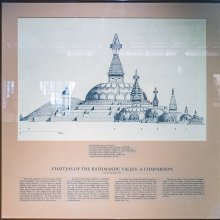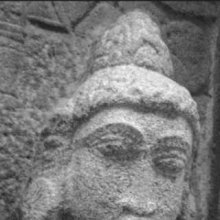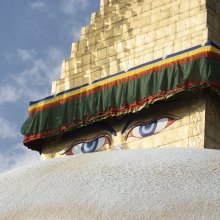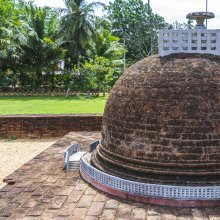Dome, Ḍōme: 2 definitions
Introduction:
Dome means something in biology. If you want to know the exact meaning, history, etymology or English translation of this term then check out the descriptions on this page. Add your comment or reference to a book if you want to contribute to this summary article.
Images (photo gallery)
(+26 more images available)
Biology (plants and animals)
Source: Google Books: CRC World Dictionary (Regional names)Dome in India is the name of a plant defined with Lannea coromandelica in various botanical sources. This page contains potential references in Ayurveda, modern medicine, and other folk traditions or local practices It has the synonym Dialium coromandelicum Houtt. (among others).
Example references for further research on medicinal uses or toxicity (see latin names for full list):
· Journal of Agricultural and Food Chemistry (6697)
· Der Gesellsschaft Naturforschender Freunde zu Berlin, neue Schriften (1803)
· Journal of Cytology and Genetics (1990)
· Blumea (1948)
· Revisio Generum Plantarum (1891)
· Systema Naturae, ed. 12 (1767)
If you are looking for specific details regarding Dome, for example diet and recipes, extract dosage, health benefits, pregnancy safety, side effects, chemical composition, have a look at these references.

This sections includes definitions from the five kingdoms of living things: Animals, Plants, Fungi, Protists and Monera. It will include both the official binomial nomenclature (scientific names usually in Latin) as well as regional spellings and variants.
Languages of India and abroad
Kannada-English dictionary
Source: Alar: Kannada-English corpusḌōme (ಡೋಮೆ):—[noun] a big, cylindrical percussion instrument consisting of a hollow cylinder or hemisphere with a membrane stretched tightly over both the ends, played by beating with the hands, sticks, etc.
--- OR ---
Dōme (ದೋಮೆ):—[noun] any of a large family (Culicidae) of two-winged dipteran insects, the females of which have skin-piercing mouthparts used to extract blood from animals, including humans; a mosquito.
Kannada is a Dravidian language (as opposed to the Indo-European language family) mainly spoken in the southwestern region of India.
See also (Relevant definitions)
Starts with: Domestic animal, Domestic observance, Dometere.
Ends with: Adome, Chidome, Edome.
Full-text (+41): Kalasha, Ghumati, Ghumata, Manikuruju, Stupa, Shikhara, Doma, Cetiyagabbha, Kubba, Palimva, Gumbada, Golambara, Rayagopura, Gumbad, Golambar, Pedagepagu, Kalasamidu, Amalaka, Gummasu, Kalashavidu.
Relevant text
Search found 73 books and stories containing Dome, Ḍōme, Dōme; (plurals include: Domes, Ḍōmes, Dōmes). You can also click to the full overview containing English textual excerpts. Below are direct links for the most relevant articles:
Manasara (English translation) (by Prasanna Kumar Acharya)
Chapter 18 - The general features of edifices (vimāna-lakṣaṇa)
Chapter 20 - The two-storeyed buildings (dvitala or dvibhūmi)
Chapter 28 - The ten-storeyed buildings (daśatala or daśabhūmi)
Egypt Through The Stereoscope (by James Henry Breasted)
Position 4 - Cairo, Looking Southwest Across The City To The Great Pyramids, That Furnished Stone For Many Of Its Buildings < [Standpoints In Egypt]
Position 5 - “ship Of The Desert” Passing The Tombs Of By-gone Moslem Rulers, Outside The East Wall Of Cairo < [Standpoints In Egypt]
Position 2 - Cairo, Home Of The Arabian Nights, The Greatest City Of Africa, Northwest From Saladin's Citadel To The Nile < [Standpoints In Egypt]
Stupas in Orissa (Study) (by Meenakshi Chauley)
Evolution of Stupa as seen from Archaeological remains < [Chapter 3]
Stupa at Sanchi < [Chapter 3]
Dharmarajika Stupa < [Chapter 3]
Amaravati Art in the Context of Andhra Archaeology (by Sreyashi Ray chowdhuri)
The early phase of Amarāvatī art (2nd-1st century BCE) < [Chapter 5 - Impact of Amarāvatī Art]
Triratna (triple refuge) < [Chapter 3 - Amarāvatī and the Formative Stage of the Buddhist Art]
Region Beyond The Coastal Lines (1): Dhulikaṭṭa < [Chapter 2 - Amarāvatī and other Archaeological Sites of Ancient Andhra Pradesh]
Vishnudharmottara Purana (Art and Architecture) (by Bhagyashree Sarma)
8. Characteristic Features of Sarvatobhadra Temple < [Chapter 4 - Temple Building]
3. A General Note on Art < [Chapter 1 - Introduction]
Garga Samhita (English) (by Danavir Goswami)
Verse 3.9.38 < [Chapter 9 - The Birth of Śrī Girirāja]
Verses 2.19.9-10 < [Chapter 19 - The Rāsa-dance Pastime]
Verse 2.25.12 < [Chapter 25 - The Rāsa-dance Pastime]





